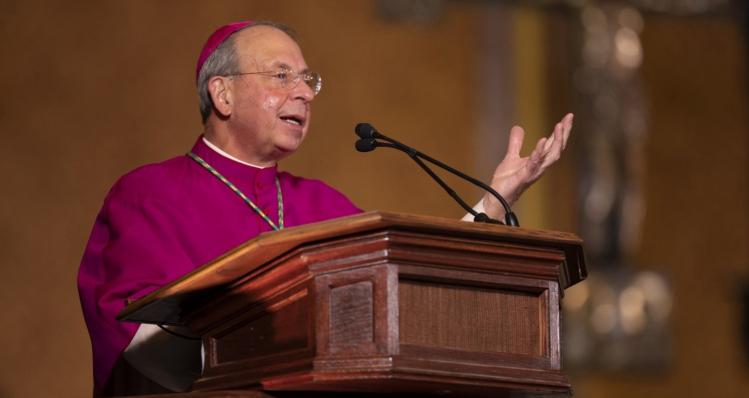
On Wednesday, May 4, Religion News Service (RNS) carried a dispatch headed “Roe v. Wade: Faith leaders react to leaked SCOTUS opinion.” The article quoted twenty different “faith leaders” speaking for or against Justice Samuel Alito’s draft opinion. Not one of these religious leaders was a Catholic bishop.
That silence was quickly broken, by individual bishops across the country and by Archbishop William E. Lori of Baltimore, the head of the U.S. bishops’ pro-life committee. They all said what was expected and in order: Catholics must care about every unborn child and every mother. The Church was doing so through many ministries and programs. If the law was changed, as they hoped it would be, Catholics would have to be ready to do far more.
I don’t know why the bishops were a lap behind other religious leaders in commenting on the leak, and I’m not unhappy about it. Perhaps RNS simply didn’t call them. Perhaps they wisely decided to take a few breaths before plunging into the scrum. They may well recall one very distinguished prelate who, for all his smarts and likeability, seemed to hew to the motto “Ready, fire, aim!”
I suspect that many Catholics also welcomed the recent announcement by the bishops’ conference that its June 13–17 semi-annual meeting would eschew all public sessions and statements in favor of a closed-doors retreat. Last June’s meeting, when the conference muddled the most genuine sacramental concern about the Eucharist with the most partisan political gesture of censuring President Biden, is all too fresh in our memory.
Unfortunately, episcopal silence at the very time when a landmark Court decision on abortion is going to be announced will be a lapse with grave consequences.
Everyone knows of the bishops’ opposition to Roe v. Wade and other Court decisions defending abortion rights, although it wouldn’t hurt to see this restated in a reasoned, sensitive, and pastoral manner. What the public has not heard is a matching statement from the Church’s leaders spelling out the components of a “culture of life” that would protect and empower vulnerable women and children. Those components would have to include the guaranteed provision of health care, paid maternal leave, childcare, income support, and a variety of anti-discrimination measures. They would have to include a firm cultural and legal rejection of violence against women and sexual predation. They would have to include personal compassion and a vigorous mobilization of Catholic generosity for women and families confronting troubled or tragic pregnancies.
Noteworthy among the brief RNS statements from faith leaders who wanted to see Roe overturned were those stressing the responsibility to provide support and assistance to women and children. The bishops can do no less, but the conference as a whole has a sound basis in Catholic social teaching to do much more.
In a column for Religion News Service, Jacob Lupfer noted that curtailing abortion access meant “we will need robust pro-child policies and more government assistance to children and families. Republicans and the pro-life movement should lead the charge for these public investments, and perhaps religious leaders like the United States Conference of Catholic Bishops can provide moral leadership in holding them to account.”
It does not follow that the bishops must offer a full-fledged policy agenda in response to any Supreme Court decision. That would be impossible, if not improper. I have argued in Commonweal that the bishops should embark on a full-scale pastoral letter on abortion in all its complexities and ambiguities. But this is not the time for that. The bishops can acknowledge that assuring a full range of public and private measures to protect women and children is a challenging task, for which they have no precise blueprint. But the episcopal response has to be unambiguous about the direction and urgency of change, the need for personal and collective sacrifice, and the immorality of demanding sacrifice only from those who are already burdened.
There is strong precedent in the statement made last March by Archbishop José H. Gomez, president of the conference, and eight bishops leading committees addressing issues of women and children. “We exhort our nation to prioritize the well-being of women, children, and families with both material resources and personal accompaniment,” the bishops declared, “so that no woman ever feels forced to choose between her future and the life of her child.” They called upon the Church not only to welcome and support women challenged by their pregnancies or difficulties in caring for children after birth but also “to redouble our advocacy for laws that ensure the right to life for unborn children and that no mother or family lacks the basic resources needed to care for their children, regardless of race, age, immigration status, or any other factor.”
No one knows exactly when the Court will issue its ruling, or how closely the final ruling will resemble Alito’s draft opinion. It could occur before the bishops disappear into contemplative silence behind closed doors. It could occur during or afterward. But a short, resounding statement has to be at the ready, and it must come from some source representing the bishops’ conference—the USCCB’s pro-life committee, the conference president, the administrative board. Whatever the precise nature of the Court decision, the bishops must use the occasion to emphasize that protecting unborn life and caring for mothers and families entail obligations on everyone, especially those of us with anti-abortion convictions.
Timing may not always be everything, but in this case it’s about ninety percent. If the bishops say nothing or imagine that their longstanding opposition to abortion says all that needs saying, then their voices—and the Church’s voice—will be swallowed up by the harshest and most partisan reactions on either side of the debate, including some who falsely pretend to represent the Church. If the bishops allow that to happen, then harmful public perceptions about the Church’s views will be fixed in place during the many difficult battles about abortion yet to come.

